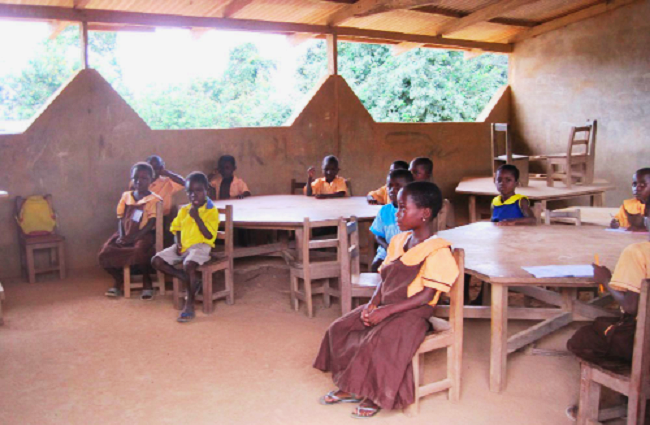
Superior prospects for March 6, 2017, and beyond.The conscience to green and improve the public schools
Many conscientious writers tend to be influenced by the wisdom of poets. Kwame Nkrumah set a tone in the preface of his book, “GHANA: The Autobiography of Kwame Nkrumah” (written in 1957, at the dawn of Ghana’s independence) by quoting the American poet Walt Whitman (1819 – 1891): “Whoever you are holding me now in hand … / I give you fair warning … / release me and depart on your way.”
Similarly, Ngugi Wa Thiong’o borrowed for his 1964 novel, “Weep not, child” from Whitman: “Weep not, child / Weep not … / The ravening clouds shall not be long victorious, / They shall not long possess the sky.”
Ngugi’s novel, “Weep not, child”, recalled the advent of the Mau Mau insurrection under Jomo Kenyatta - the prelude to Kenya’s independence in 1963. The book opens with the following question asked of a boy by his mother: “‘Would you like to go to school?’ ‘O, mother!’ Njoroge gasped. He half feared that the woman might withdraw her words. There was a little silence till she said, ‘We are poor. You know that … So you won’t be getting a mid-day meal like other children.’ [The boy replied:] ‘I understand … I like school.’” The boy knew that for him “education would be the fulfilment of a wider and more significant vision … He saw himself destined for something big, and this made his heart glow”.
Today, can there be any tolerable reason to continue celebrating the African Union Day with yet another holiday when the African child is still at risk? Can there be any acceptable reason why by March 6, 2017 - a hefty 60 years after Ghana’s independence - a good many people will still be illiterate, meaning that they cannot read or write in their own mother tongue, and can neither read nor write in the official language, English? How on earth must a nation so richly endowed by providence be so heartless that it neglects meaningful education for its own children? How can a nation be so aloof that it should come to this! Illiteracy and independence are strange bedfellows indeed.
Advertisement
To see where any nation is going in the future, just watch how the nation treats her own children. The tell-tale signs are rampant in most parts of Africa – including Ghana. I recall a trip to an European capital where after a meeting we stepped out for lunch. Looking around me there was not a single child in sight except for a gypsy child and a woman crouched in a corner.
Having arrived fresh from Ghana with memories of children loose on the streets, I asked the host: “Where are all the children?” He turned with a look and said, “They are in school!” One can surmise how strange the request must have been to him. But it was an honest question for which an honest answer was given.
In lieu of marching every March 6, with holidays to boot, the celebrations of our independence must mean much more that a stifling tribute. The children need loftier prospects than merely marching on. The force of superior examples are hard to ignore.
In this column (March 30, 2015), under the subtitle, “What a difference a superior leader makes!” I noted the Singaporean example through Lee Kuan Yew’s leadership. He said, “We educated [the] children in schools by getting them to plant trees, care for them, and grow gardens … I got the ministry of defense in charge of national servicemen, the ministry of education with half a million students under its care, and the National Trade Union Congress with several hundred thousand workers … to make Singapore a pleasanter place for ourselves, quite apart from the tourist trade.”
The miracles that transformed the south-east Asian countries did not happen by marching, and they sure did not happy by prayers. The Singaporean leader’s determination for a cleaner, greener, prosperous nation spoke volumes; and the people followed – some with gusto; and even those with reluctance saw the sense in following. From today, Lee’s thoughts must rattle every poor nation - especially through those people in paid perky positions - to make a difference.
From a young reader of this column, I received the following: “We are all concerned about deforestation, desertification, heat, dust and the sicknesses the harmattan season brings, why not do something about it? Why not green Ghana? Why not make the theme of each 6th March – ‘A Clean and Green Ghana’, planting trees in our school compounds that are permanently brown from dust, our hospitals, our houses, along our roads ... We all learn the benefits of trees in school. We spend hours in the classroom learning Agricultural Science. Wouldn’t this be the best way to apply this knowledge?”
The following purposeful thoughts which guided Lee must serve as the guiding mantra: One, The key to success was the quality of the people in charge; Two, a soft people will vote for those who promised a softer way out, when in truth there is none; Three, The world does not owe us a living. We cannot live by the begging bowl; and 4. If we were to succeed, we had to depend on ourselves.
It’s been surmised that if Ghana achieved basic skills for all its 15-year-olds, the nation would expand its current Gross Domestic Product (GDP) by 38 times, over the lifetime of today’s youngsters. That fact alone must ring loud as we perceive the substance of the next independence day.
